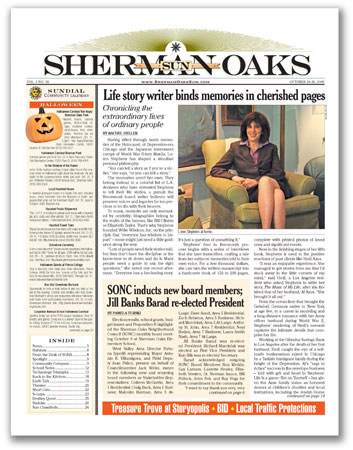
Sherman Oaks Sun October 20-26,2006 VOL. 3 NO. 38
Local jazz singer reinvents her genre
BY LYNN MILLS
Put on the first cut of the Tierney Sutton Band’s Grammy-nominated CD, “I’m With the Band (2005),” and a classical arpeggio- jazz scat hybrid lilts out of the speakers, at once earthy and ethereal.
You might say, “Hey, I thought this was a jazz album?” before Sutton launches into a swinging rendition of the timeless “Softly, as in a Morning Sunrise.”
With singer Tierney Sutton and her band, the standards are anything but standard. Duly noted, Sutton will be honored on October 22 with the Jazz Vocalist Award at the Los Angeles Jazz Society’s 23rd Annual Jazz Tribute.
A playful quality comes through as Sutton, Christian Jacob (piano), Ray Brinker (drums), Trey Henry and Kevin Axt (alternating on bass) take you on a roller coaster ride through each song. Tempos shift repeatedly. Vocals are inventive, crisp, warm, embracing. You may have heard these songs a million times, but the band manages to make them seem brand new, leaving you breathless.
“The mainstream tradition was done about as well as I think it’s ever going to be done,” says Sutton. “So what is it that I can do that brings the sensibilities of my own time, my own voice to a different place, to move the story forward? To me, that’s what jazz is really about. It’s about innovation.”
Raised in Milwaukee by “very alterno” parents – her father is a civil rights lawyer and her mother was a commercial artist – the Van Nuys resident’s unusual musical style complements the way she looks at life and career.
Despite numerous recordings and awards (including Jazz Week’s 2005 Vocalist of the Year), appearances at Lincoln Center, Carnegie Hall, and the Hollywood Bowl, Sutton and her band won’t shy away from playing small venues – like a little jazz club in Dayton, Ohio, at the Greyhound Bus Terminal.
While the big venues “are really nice,” she says, “the weird thing is that they’re not as ‘esteeming’ as the person that drives across two states to see you at the bus depot. Those are the real things that feed your soul.”
She first discovered jazz in college. A Russian language and literature major at Wesleyan University in Connecticut, Sutton was a singing cocktail waitress when she heard a jazz trio at the country club across the street.
“I became a jazz monk and that’s all I listened to for about ten years. All the records I bought, every song I learned, was in that tradition because I was really thirsty for it. It was like learning a new language. But I fell in love with it.”
She adores Carmen McRae, Shirley Horn and Sarah Vaughn, but her vocal influences are mainly instrumentalists like Miles Davis, John Coltrane and Stan Getz. She aims to achieve a different sound then other singers, and she succeeds.
Sutton made the unusual choice of moving to Los Angeles to pursue jazz in the early 90s. “Any self-respecting jazz singer would move to New York,” she admits, due to the slew of jazz venues dotting the East-coast hub. But she soon found the decision could actually work to her advantage. “L.A. was a cool place to be if you were one of the few serious jazz singers where there are so many great jazz instrumentalists who often need a singer to get a gig,” Sutton explains.
She started out listening and taking notes at local clubs like the Money Tree and Chadney’s, then started performing at open mikes and jam sessions. She got small gigs, sang jingles and taught voice to survive – at one point, she became head of the Vocal Jazz Department at USC.
The Tierney Sutton Band’s formation marks the next step in the singer’s musical journey. “It is ridiculously democratic,” she notes. “The best arrangements we’ve done, it becomes unclear who provided what by the end of it.”
They spend about one week per month on the road, mostly in New York. But for Sutton, that entails time away from her husband, Alan (a musician for the film industry), and her son, Ryan. “Anything that messes with either of those things has to have a really good reason for being there,” she says.
Art, not commerce, is still Sutton’s main focus. “We don’t think, well, what record are you going to make that’s going to sell 12 million records? I realized that all my goals were the same as all the jazz musicians that I knew – to make records that would be listened to in 50 years, that were unusual or worthwhile in some way, because that’s how we function as jazz musicians.
“If your motivation is, ‘This is something I need to do, and if I do it in the closet, that’s great, and if I do it at Carnegie Hall that’s great,’ then you’re safe.”